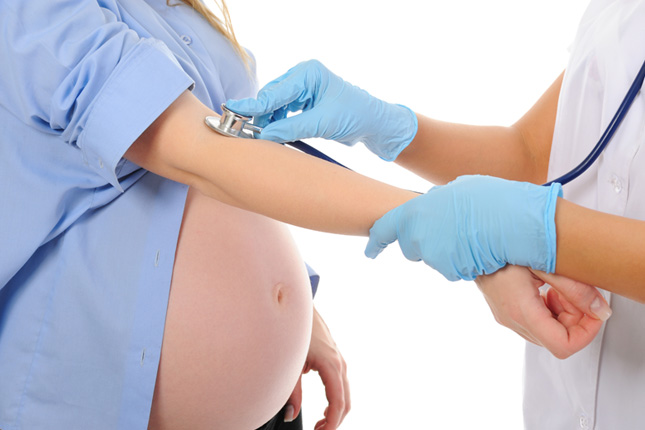Preggie Pals
Preeclampsia: Symptoms and Treatments
[00:00:00]
Please be advised, this transcription was performed from a company independent of New Mommy Media, LLC. As such, translation was required which may alter the accuracy of the transcription.
[Theme Music]
DOCTOR CHUNJAI CLARKSON: It can be a little scary to receive a call from your care provider that you’ve been diagnosed with preeclampsia. What does that mean for you, your baby and your delivery? I’m Doctor Chunjai Clarkson and today we’re learning about the symptoms and treatment of preeclampsia. This is Preggie Pals.
[Theme Music/Intro]
STEPHANIE GLOVER: Welcome to Preggie Pals, broadcasting from the birth education centre of San Diego. Preggie Pals is your online support group for expecting parents and those hoping to become pregnant. I’m your host, Stephanie Glover.
Thanks to all of our loyal listeners who’ve join the Preggie Pals club. Our members get special episodes, bonus content after each new show plus special giveaways and discounts. See our website for more information.
Another way for you to stay connected is by downloading our free Preggie Pals app available in the Android, iTunes and Windows market places. Sunny our producer is now going to give us some information about our virtual panelist program.
SUNNY GAULT: Hey everyone! Okay, so we’ve got a really cool opportunity for you guys to get involved with Preggie Pals even if you’re not here in the studio with us. You can like our facebook page. You can follow us on twitter. We’re going to be posting using #preggiepalsvp which stands for virtual panelist. So I’m going to be doing that throughout today’s show.
So whenever our panelists ask some good questions, I’ll post those to you guys as well. And when our expert, you know give some good information, I’ll be posting little nuggets of information through both of those sites. So, again follow us on Facebook, follow us on Twitter, and you can be part of the conversation as well. And if you participate there’s an opportunity to win some cool prizes. So, please do so
STEPHANIE GLOVER: Awesome! Thank you Sunny.
SUNNY GAULT: Sure
STEPHANIE GLOVER: So, we’re going to go ahead and go around the table and introduce ourselves and our panelist. I’ll go ahead and start, my name is Stephanie Glover, I’m 32 years old and I’m a stay-at-home mom. I don’t have a due date right now but I’ve got two little ones. My first is three years old Gretchen and she was my C-section baby. And then I have an eleven-month-old daughter Lydia who was my VBAC
ANTOINETTE BARKER: I’m Tony Barker and I’m 22. I’m a stay-at-home mom and I have one baby girl named Ellie and she was delivered via cesarean because I had preeclampsia at 33 weeks
MELINDA EDENS: Hi I’m Melinda, I’m almost 44. I’m a nanny. My due date with this current baby which is my fifth surrogate baby is October 9th. I’ve had, this will be my , ‘oh my gosh’ I think fourth girl and second boy. I’ve lost track. Something like that. My own two children are 21 and 23. I have had 4 vaginal deliveries and a VBAC, as well as a vaginal birth after two caesareans, and I’m hoping that this one will be a repeat vaginal birth after two caesareans
SUNNY GAULT: Awesome. Well you guys know me, I’m Sunny. Today I’m producing today’s show. So I have four kids of my own, all under the age of four. My oldest is about to turn four like I said, Sayer, a boy. I have a two-year-old boy and then I have identical twin girls who are about eight months old. So, that’s me.
[Theme Music]
SUNNY GAULT: So before we get started with today’s show we’re going to talk about a headline that is making the rounds on the internet. Actually, this is through Huffington Post, if you guys visit that site there’s a lot of good articles over there. Actually, I saw this on a video. It was primarily a video and then they wrote up this little blurb about it. And it really got me thinking and the whole thing was about what we name our kids.
And there was a mom who really wanted to name her daughter after herself like using her first name and her name is Shiela Grady. And she actually gave her daughter the name I don’t know if it was, you know in the hospital right away or is it before any paperwork was done but they went in thinking that they’re going to name her baby Christine, a very pretty name. But then after the baby arrives they were just kind of mauling it over their heads and then didn’t think it felt quite right.
So, Shiela, the mom, said I really liked the name Shiela. Which I think is kind of funny who really likes their names, but that’s okay. And she said, I really want to name my, the baby, Shiela. And so they kind of switched it and I have a feeling there was no paper work really done because that’s a whole nightmare if you try to switch it after that. So after twenty five hours or twenty four hours of her daughter being born she switched it from Christine to Sheila. And it really got me thinking we don’t see that a lot in our culture at least. We see juniors from you know dad, okay dad was mad or Mark or whatever and you got a Mark Junior, James Junior. But we don’t see that a lot for women. I kind of want to toss it out to you ladies to say, what do you think about this? Could you actually, could you do something like this for a child? Would you be interested in doing that or do you think that there’s some cultural things that have to be considered? What do you think?
ANTOINETTE BARKER: I don’t know I think I would feel funny naming like my daughter after me. But at the same time it makes sense because fathers do it all the time to their like to their sons. My dad is named after my grandfather and everything. But like you said it’s just so, so out of the norm like to have a daughter named after the mother but, I’m named after my Aunt and my sister, she’s named after her father because his name is Steven and her name is Steevie so
SUNNY GAULT: Yeah
ANTOINETTE BARKER: But, yeah, I don’t know, I don’t know if I could do it
MELINDA EDENS: I wouldn’t do it particularly just because I’m not wild about my own name. I did give my daughter, or I should say, we gave our daughter my middle name which is Michele with one L, not too creative but yeah I’ve never been real fond of my name so I wouldn’t necessarily pass that down to my, my own daughter now
SUNNY GAULT: Yeah
STEPHANIE GLOVER: I know, yeah I kind of feel the same way. I liked my middle name which was Erin and had considered that before but my part of me says the feminist in me wants to say ‘that’s awesome. Because we’re you know as women we often, we give up our last names most of the time when we get married. But at the same time just for like logistics, I probably wouldn’t do it to I don’t know ‘who were you calling for in the house? Is it me or my daughter?’
SUNNY GAULT: Well that’s what they said in this article too in the video that’s on Huffington Post website is that that was, I mean the daughter’s older now she’s like you know in her 20’s. So this happened a while ago but they recently did the article. Anyways, that’s what they said that it was quite confusing when you call the house and that for Doctor’s appointments and stuff like that they would just say ‘hey this doctor’s appointments for Shiela and then both show up for an appointment and whatever but again you would have this same issue wouldn’t you if there was a son?
Yeah because in my family, my son is a junior he’s Shaun Junior and that it gets a little confusing in you know still we he’s an adult, he’s in the Marine Corps which my husband also was so he’ll get mail for a corporal [inaudible] which is my husband too. So it’s bizarre
SUNNY GAULT: I don’t know if I could do that either. One of my twins named, her first name is Addison and her middle name is Marie. And my name is Sunny Marie. But when I say her name it’s Addison Marie so it looks like it’s kind of, it sounds like it’s part of it like SunMarie, Sunny Marie. That was as far as I went. I thought, okay, I’ll give one of them my middle name and then that’ll be good
ANTOINETTE BARKER: My mom, I also have my mom’s middle name too so I mean she’s Dawn Serene, I’m Antoinette Serene also but not the first name. I kind of like the idea of just that individuality, you know giving them their own
SUNNY GAULT: Yeah their own entity
ANTOINETTE BARKER: Yeah
SUNNY GAULT: I just think it’s interesting the gender line we have created here. That’s okay for guys but women kind of stand-off, we do it on our own. We kind of stand-off on our own, it’s not someone’s saying you can’t do that, it’s just we just kind of back off. That was interesting
[Theme Music]
STEPHANIE GLOVER: So today we’re talking about preeclampsia and joining us here in the studio is Doctor Chunjai Clarkson, a Board Certified OBGYN caring for patients and delivering babies for fifteen years with an active practice in north county San Diego affiliated with Tri City medical Centre. So let’s just start off the conversation by having you explain to us what preeclampsia is
DOCTOR CHUNJAI CLARKSON: So Preeclampsia of course a course in pregnancy. It’s one of four major hypertensive disorders of pregnancy. It’s a multi system disorder characterized by the new onset of hypertension which is elevated blood pressure. And either [inaudible] which is protein in the urine or an organ dysfunction. Most affected pregnancies deliver at a new term with good outcomes but these pregnancies are at they’re at increased risk for a serious complications for a mother and baby.
STEPHANIE GLOVER: And what are some symptoms, how do you know that you need to be checked or that you might be at risk
DOCTOR CHUNJAI CLARKSON: For mildly elevated blood pressure you may not have any symptoms and so that’s why it’s important you’ll notice that your OB appointments that we’re checking for blood pressure and we’re dipping the urine at each visit. But some symptoms that are common are headache, visual abnormalities, sci-tomita which is seeing sparkly lights or I’ve heard them called all sorts of different things simulating amoeba, blurred vision, also upper abdominal or epigastric pain, nausea, vomiting, dyspnea which is means shortness of breath or altered mental status. Those were some that kind of occur if preeclampsia is severe.
STEPHANIE GLOVER: Okay. You mentioned the routine screening for the urine and the blood pressure in appointments, is that usually how it’s diagnosed or are there additional tests to diagnose severe preeclampsia
DOCTOR CHUNJAI CLARKSON: Often that is our first sign
STEPHANIE GLOVER: Okay
DOCTOR CHUNJAI CLARKSON: That the blood pressure is elevated, Of course you know it could be you ran up the stairs or you know often you repeat it and it may be normal. Or maybe it’s the cup needs be a different size if in a bigger ahead of your patient, a larger cup maybe needed and the blood pressure may be normal if that is done. But, so blood pressure and also, so if someone comes in, the blood pressure’s elevated it’s we repeat the blood pressure and it is still elevated. I will often send that patient or some doctors may do, be able to do laboratory work in the office. But what I do is I will send that patient to labour and delivery and there they get a blood count, they check liver function test and also renal function and get an upper urinalysis to see if there is protein
STEPHANIE GLOVER: And can it come on really quickly or do you start seeing trends in the, in the prenatal visits just with the blood pressure or can a patient just get it overnight?
DOCTOR CHUNJAI CLARKSON: Absolutely. It can present suddenly and sometimes when it presents very early those patients are the ones that have a very fulminant course and have progression of the disease relatively quickly and that’s when it can be quite dangerous
STEPHANIE GLOVER: Ultrasound
DOCTOR CHUNJAI CLARKSON: Yes
STEPHANIE GLOVER: And Tony, you mentioned before the show we were chatting. So how did you sort of noticed that you had preeclampsia? What are some of your signs?
ANTOINETTE BARKER: Well I actually didn’t, I didn’t realized I was having any symptoms because I wasn’t really well informed on preeclampsia. And I kind of talked off some of my symptoms to be pregnancy related because I mean you know a lot of pregnant women get headaches here and there and you know they get gas and all these other little symptoms that you can have they’re kind of similar. But I went in to my midwife appointment and I was like thirty two weeks and four days I think and my blood pressure was elevated and so they were a little concerned and they, they did a uterine dip and they said ‘oh you do, you have protein in your urine which you know they were saying okay well I think it’s time, you need to get monitored at the hospital for twenty four hours because you could be at risk for preeclampsia. And so that was how I found out but after the fact I realized that I was having the chest pains, I sort of felt like I had a balloon that was inflated in my chest and I had a lot of headaches and I was extremely swollen because I was retaining so many fluids. And so those are some symptoms that I did have I wasn’t aware until after I was told that I had severe preeclampsia but yeah those are a few
STEPHANIE GLOVER: Okay. How about you Melinda?
MELINDA EDENS: My story was kind of similar to Tony’s. I did have some swelling in my feet primarily; it was not really my hands or my face. But I noticed it probably three or four weeks before the actual diagnosis and again you know it would have been fifteen years since I had had my own children. So and I do remember having since, you know minor swelling or what have you. But when I went in for my twenty ninth week check-up, I was twenty nine weeks and two days thinking everything was fine in spite of the edema that I had in my feet. They, you know, they took my blood pressure and it was extremely high. I don’t remember off the top of my head. It’s been six years now but it was very high. And immediate cause for concern and the doctor of course dip the urine and there was protein in it so boom, they we’re sending you right over the L & D and we’re going to monitor you and you may not be coming home basically. So, there I am in the hospital and things progressed really quickly. I mean my kidneys shut down; they were pretty much by the next day you know that once they started the magnesium and everything and they gave me the steroid injections to mature the baby’s lungs.
It was pretty much determined you’re going to be delivering by this evening and before we knew it, it came down. It wasn’t an emergency situation but it was definitely urgent and because she was breached till at that point at twenty nine weeks and three days, I did have to consent for the caesarean. And so it, they tried to give me an [inaudible] to you know numb so I can be awake for the delivery which I really wasn’t happy about. But it didn’t work so they ended up giving me the general and just you know got her out as quickly as they could because I was crashing fast. So and then I was very sick in the hospital for the next five or six days. I lost so much blood, they hung I think three or four units. I was so sick. It was just, it was very scary and I literally thought I would never feel like me again. That’s how bad it was the whole experience. Very scary.
STEPHANIE GLOVER: Wow and so you’re gestational weeks weren’t too far off. You were twenty nine two
MELINDA EDENS: Twenty nine three
STEPHANIE GLOVER: Thirty or twenty nine three. You were thirty two weeks so; Dr. Clarkson is that about the time that women tend to
DOCTOR CHUNJAI CLARKSON: Actually I would say that was a little unusual
STEPHANIE GLOVER: Oh okay
DOCTOR CHUNJAI CLARKSON: Thankfully. Most people present after thirty four weeks closer to term
STEPHANIE GLOVER: Okay
DOCTOR CHUNJAI CLARKSON: You know it’s very common in. It’s common in patients who are having their first pregnancies. So and it’s a reason that we induced towards term at thirty seven weeks. But it’s, most people present in the latter half of their pregnancy after thirty four weeks
STEPHANIE GLOVER: Okay. And so you mentioned first time moms tend to get preeclampsia more frequently than others. Are there any other risk factors that would you know make you think that you might be more prone to getting it?
DOCTOR CHUNJAI CLARKSON: Yes there are. So who is at risk for preeclampsia? If you have . . . so we already mentioned knowledge, first time pregnancies. Also if you had a past history of preeclampsia in a previous pregnancy actually women with severe preeclampsia early in pregnancy in the second trimester are at the greatest risk of developing preeclampsia. But if you had early preeclampsia you are at an increased risk in subsequent pregnancies. Also family history of preeclampsia in the first degree relative, I actually have preeclampsia myself. I was delivered, I was induced at thirty seven weeks and my mother had significant preeclampsia or she actually had eclampsia which is seizures.
So, which is a severe manifestation or develop a development of a in the, on the progression of preeclampsia. Let’s see, pre-existing medical condition such as chronic hypertension. If you’re hypertensive to begin with you may be on medication. Some people come in and they’re already taking [inaudible] those patients are at an increased risk. Diabetics are at an increased risk. Older mothers, which we term of course, advanced maternal age that wonderful term of
STEPHANIE GLOVER: And what does that mean
DOCTOR CHUNJAI CLARKSON: Patients over thirty five. Because they are at an increased risk of diabetes and increased risk of hypertension as we get older. Thus these increase.
STEPHANIE GLOVER: And when you say diabetes is that diabetes that existed prior to pregnancy or are women who have gestational diabetes at greater risk?
DOCTOR CHUNJAI CLARKSON: Both
STEPHANIE GLOVER: Okay
DOCTOR CHUNJAI CLARKSON: Both. The pre-existing diabetics and gestational diabetics do have increased risk. And also other diseases such as chronic kidney disease where there’s already end organ dysfunction and people who are very heavy with body mass index over twenty six point one, that’s the, they are at an increased risk too.
STEPHANIE GLOVER: And I’ve read in some of my pregnancy books that they’re not sure what causes it but they’re due seemed to be some risks, risk factors that can be considered. So is there a determined actual cause for preeclampsia?
DOCTOR CHUNJAI CLARKSON: There is, there, let me mention one other risk factor ethnicity. Africa-American women are at somewhat increased risk but as far as the cause of preeclampsia the basic thought is that the way the placenta vasculature develops early in pregnancy. Abnormalities not development the trigger ballistic invasion into the maternal tissue, the uterus that had has, that is a factor in the development of preeclampsia. And basically in pregnancy you want a high flow low pressure system. In preeclampsia you sort of get the opposite, you get more resistance or vaso constructed state. And a low flow system so, that can affect a lot of different things. It can affect the growth of the baby actually where the babies are, have a don’t grow appropriately because they’re, there’s resistance to flow. I don’t know if either of you have that issue. Did you?
ANTOINETTE BARKER: No I
DOCTOR CHUNJAI CLARKSON: Know your baby’s growth restricted or
ANTOINETTE BARKER: No they said that everything with her was fine and it was more of an issue with my kidneys. It’s like not functioning correctly and stuff so she was okay
DOCTOR CHUNJAI CLARKSON: They were appropriately the size
ANTOINETTE BARKER: Yeah
MELINDA EDENS: As with my surrogate baby yeah, she was two pounds eleven ounces when she was born but all things considered she did extremely well and is completely healthy normal today so.
ANTOINETTE BARKER: I mean yeah, like my daughter she was smaller but it was because she was only thirty three weeks when she was delivered but it wasn’t, they didn’t say that she had been restricted or anything like that so,
DOCTOR CHUNJAI CLARKSON: And that’s the nice thing as the babies can do perfectly well
ANTOINETTE BARKER: Yeah.
DOCTOR CHUNJAI CLARKSON: If they’re delivered in time
STEPHANIE GLOVER: So when we come back we’ll discuss prevention, treatment and labour implications of preeclampsia. We’ll be right back
[Theme Music]
STEPHANIE GLOVER: So, welcome back. Today we’re discussing preeclampsia. Dr. Chunjai Clarkson, OBYGN is our expert. So, in continuing our conversation, are there ways to prevent developing preeclampsia?
DOCTOR CHUNJAI CLARKSON: Yes there are. There have been many studies, large studies and meta-analysis and it sort of gone back and forth the initial studies show that lotus aspirin was helpful in the prevention of preeclampsia. And then some largest studies show that they were not as helpful. But when they put the all of those largest studies together and did several meta-analysis of the data, it does seem to, they do, the data does seem to point to lotus aspirin giving a small but statistically significant benefit in reducing the risk of preeclampsia. And lotus is sixty milligrams to one hundred fifty milligrams of aspirin a day.
STEPHANIE GLOVER: Okay. And anything with diet, can that be helpful?
DOCTOR CHUNJAI CLARKSON: Well anti-oxidants have been proposed however there’s just insufficient data for any reliable conclusions on anti-oxidants. Although they’re beneficial in other ways and actually calcium, there really is no benefit in low risk women for taking calcium in the prevention of preeclampsia
STEPHANIE GLOVER: But it can be helpful with high risk?
DOCTOR CHUNJAI CLARKSON: There may be a benefit in some high risk populations especially those with a low calcium diet for calcium supplementation
MELINDA EDENS: I had read that too in several books. High risk patient yeah
DOCTOR CHUNJAI CLARKSON: Are you guys on calcium?
MELINDA EDENS: I take Calmax Nitrate as well as fish oil. I read a super book on it and things like you know organic diet is supposed to be beneficial. And you know it could be speculation but it certainly can’t hurt. I don’t feel so, I’ve been lucky this far since then
DOCTOR CHUNJAI CLARKSON: And you know may be that just the data it’s we don’t have the data yet
MELINDA EDENS: Right
DOCTOR CHUNJAI CLARKSON: And we may not have the data. It’s difficult I think with diet and you know
STEPHANIE GLOVER: The great thing about an organic diet is the other no harm no fear
MELINDA EDENS: Exactly
ANTOINETTE BARKER: That’s right
STEPHANIE GLOVER: Yeah will only be beneficial. And are either of you on the lotus aspirin?
ANTOINETTE BARKER: I’m not
MELINDA EDENS: I am. I happen with every pregnancy since then I take the eighty one milligrams per evening and yeah
ANTOINETTE BARKER: And I’m not pregnant.
STEPHANIE GLOVER: That’s true
ANTOINETTE BARKER: I mean if I were pregnant then I’m sure that they would may be, you know tell me that that’ll be a good idea but I haven’t been using any
STEPHANIE GLOVER: So how is preeclampsia treated once you’ve been diagnosed?
DOCTOR CHUNJAI CLARKSON: Well the definitive treatment for preeclampsia is delivery. A mild preeclamptic say blood pressure one forty seven over nineties may and before term may just be followed. We make out weekly NSTFI’s growth scans, weekly labs. An NSTFI’s that NST stands for non-stress test, and it’s a way of assessing foetal wellbeing. This may be done on an office setting or it may be done at a hospital. At Tri City for the most part it’s done on Labour and Delivery at the hospital. So, the non-stress test is done to measure the acute status of the baby. And fluid is checked which is a chronic indicator of foetal wellbeing.
So you know someone has blood pressure one forty over ninety or as borderline blood pressures that they’re just followed very closely to make sure the baby is doing well. Someone who that presents as you all did with severely elevated blood pressure, it’s a different, of course you have to be a little more aggressive and those patients are usually admitted if the blood pressure can be stabilized with medications then we may be able to prolong the pregnancy to get closer to term.
Of course it’s a benefit to the baby. Magnesium sulphate is given, usually a four grams and then two grams per hour initially. And that is for prevention of seizures. And there’s also a benefit to the baby, there’s a neuro protective effect on the baby. If the baby is born pre-term, that seems to reduce complications in the baby as well. But if you have someone like a patient I had who presented early like you all did, she was twenty nine weeks and her pressure was severely elevated.
A severe elevation is the top number, the systolic blood pressures one hundred and six, higher, one hundred and sixty or greater and the bottom number is one hundred and ten or higher. So that is severe and her blood pressure was in the two hundreds over one tens. And it was just difficult in getting that blood pressure down. And the baby of course started to, we started to see the facts in the baby with a non-reassuring foetal heart rate. And we had to deliver her urgently. So I think that’s what happened with you both I think right?
ANTOINETTE BARKER: Well, my, my daughter wasn’t showing any signs of stress but my blood pressure was so high that they were worrying about me. And you know I was using the magnesium they were giving me the magnesium and other blood pressure medications as well and it just wasn’t lowering like they wanted it to. But as I went to go deliver they had given me so much blood pressure medication that it did drop down low and so luckily though my baby wasn’t showing any signs of stress or anything like that. Nothing was wrong with the baby but
DOCTOR CHUNJAI CLARKSON: Yeah, you know if so someone was severe preeclampsia if the, when the clinical status is deteriorating either with just uncontrollable hypertension or perhaps other symptoms such as [inaudible] developing, renal failure, [inaudible] failure which can be measured [inaudible]. And when it’s over one point one that’s, it’s sign that you have a significant renal dysfunction. So things like that, typically it’s just severe, you know there’s severely elevated blood pressure, it persistent. So that the cure is to deliver
STEPHANIE GLOVER: And we mentioned some effects on the baby, but what does preeclampsia, how does that affect the baby before delivery?
DOCTOR CHUNJAI CLARKSON: The main thing is as I mentioned before is that it is can affect the baby’s growth. Actually the growth of their head is preserved and their body is smaller so it’s an asymmetric growth restriction usually with preeclampsia as opposed to infectious causes where the entire baby is smaller.
But if you have someone come in with severely elevated blood pressure, maybe their platelets are low as well, I had mentioned that we call that [inaudible] especially under one hundred thousand. And then they have a small, growth restricted baby maybe measuring four weeks behind their dates. Asymmetric then that all is consistent with you know severe preeclampsia.
The baby just is not getting enough, there’s a placental insufficiency because of the disease process. So other effects on the baby I think is significant effect if the baby has to be delivered before term which is before thirty seven weeks you know between many time after we have twenty four weeks and thirty seven weeks. There are significant complications for the baby due to prematurity.
They have their effects in their lungs. The lungs do not have time to develop and as well as the heart, the brain. There, a premature baby, infant has or baby has very you know fragile, they’re prone to having bleeds and to the brain, introventricular haemorrhage. They can have intestinal problems necrotising enterocolitis. So just, they can have multi systemic problems because of the prematurity.
And our NICU’s are really wonderful and we also give steroids that are a very helpful in boosting lung maturity. But there are significant problems due prematurity that you can expect the baby to have to stay in the NICU. Possibly have some long term developmental issues as well in some cases
STEPHANIE GLOVER: And what does preeclampsia mean for your labour and delivery? How does that affect the method in which you give birth?
DOCTOR CHUNJAI CLARKSON: As far as the mode of delivery a lot of patients should be able to deliver vaginally. That’s always a goal. We’d like to avoid the C-section if possible. And if someone is stable and we have them on the mag and you know we go through, we induce using sevedol petopia the usual methods that we use. And hopefully they can have a vaginal delivery. I just like they would otherwise. If the baby isn’t tolerating it of for the usual reasons we do C-sections. You know we have to do a C-section in some cases. So as far as that it’s I don’t think there’s a difference.
STEPHANIE GLOVER: Above than maybe higher rate of induction typically would you say?
DOCTOR CHUNJAI CLARKSON: Well
STEPHANIE GLOVER: Yeah
DOCTOR CHUNJAI CLARKSON: Well yes
STEPHANIE GLOVER: Okay
DOCTOR CHUNJAI CLARKSON: I might lean more towards offering an epidural. The epidural may help with the blood pressure. And then the magnesium, there’s, it’s a higher risk situation on labour and delivery because you’re giving someone magnesium
STEPHANIE GLOVER: And we mentioned about possible long term effects when a baby is born prematurely. But either long term health effects on the mother once she delivers the baby? Or does preeclampsia just disappear?
DOCTOR CHUNJAI CLARKSON: The preeclampsia should resolve. However there are long term effects. Women all three of us here have had preeclampsia have an increased risk of cardio vascular disease and stroke, heart attack all are a slightly increased risk. So it’s an opportunity to look at those controllable risk factors such as diet and weight and exercise and all of those preventive measures that you can take to avoid those
STEPHANIE GLOVER: Oh great, thank you so much Doctor Clarkson and for the panellist joining us today. For more information about Doctor Clarkson and as well as information on today’s panellist visit the episode page of our website. This conversation continues for members of our Preggie Pals club. After the show, Doctor Clarkson will be talking about the differences between preeclampsia, eclampsia and [inaudible] syndrome. To join our club, visit our website, www.preggiepals.com
[Theme Music]
ANNIE LAIRD: Hi Preggie pals we have a question for one of our experts. Jane in Madison, Wisconsin writes: I have terrible morning sickness. Is acupuncture something that could help relieve my symptoms?
EXPERT: This is [inaudible] acupuncture here in San Diego California. I specialize in women’s health. Men and women’s reproductive health, pregnancy, post-partum lactation and paediatrics with acupuncture [inaudible] and yes Jane I can able to help a lot of people with morning sickness with acupuncture in early pregnancy but throughout pregnancy. Sometimes it can last longer than twelve or sixteen weeks.
I’d also use acupuncture to help support moms who are already taking prescription medications for morning sickness and then able to help them reduce the dose or you can get rid of the medication. So it can be really effective as well as traditional Chinese herbal medicine. One of the main issues with traditional Chinese herbal medicine especially when you are calling from a different state want to find a practitioner that uses patent herbs or [inaudible] herbs because it’s easier for mom’s to get down.
A lot of the granules or tinctures, those kinds of things are just so hard to get down that the effectiveness is only because they don’t taste good to moms who’s already dealing with nausea and vomiting. But if you can give patent Chinese herbs and you can get them down, they can be really effective. But the acupuncture in a nut itself also can be effective.
What I tend to do is treat a woman several times as soon as the morning sickness starts in their pregnancy. As soon as they start getting the first little signs of it, I like to be really proactive about it. And then it tends to be, it doesn’t get as bad as quick and things come down quickly. If it is someone who’s been struggling with it for several weeks maybe already on till [inaudible] then we kind of do a slower treatment before we try to reduce the medication slowly.
And with the help of the OBGYN and fully try to get her body more stable and back, back in working order. A lot of what Chinese medicines thinks is going on is in energetic rebellion of the stomach and the stomach gets ungrounded in early pregnancy. And so a lot of times what happens is when mom’s develop actually quite good appetite.
Especially right during the treatment, I have them tell me as soon as their hungry I take the needles off and they go and eat. And if we get that going again usually it [inaudible] nausea and vomiting. Alright! Thank you so much.
[Theme Music]
STEPHANIE GLOVER: That wraps up our show for today. We appreciate you listening to Preggie Pals.
Don’t forget to check out our sister shows
• Parent Savers for parents with new born, infants and toddlers
• Twin Talks for parents of multiples
• Our show The Boob Group for moms who breastfeed their babies
This Preggie Pals; “Your Pregnancy Your Way”
[Disclaimer]
This has been a New Mommy Media production. Information and material contained in this episode are presented for educational purposes only. Statements and opinions expressed in this episode are not necessarily those of New Mommy Media and should not be considered facts. Though information in which areas are related to be accurate, it is not intended to replace or substitute for professional, Medical or advisor care and should not be used for diagnosing or treating health care problem or disease or prescribing any medications. If you have questions or concerns regarding your physical or mental health or the health of your baby, please seek assistance from a qualified health care provider.
SUNNY GAULT: New Mommy Media is expanding our line up of shows for new and expecting parents. If you have an idea for a new series or if you’re a business or organization interested in joining our network of shows through a co-branded podcast, visit www.NewMommyMedia.com .
[00:33:41]
[End of Audio]











